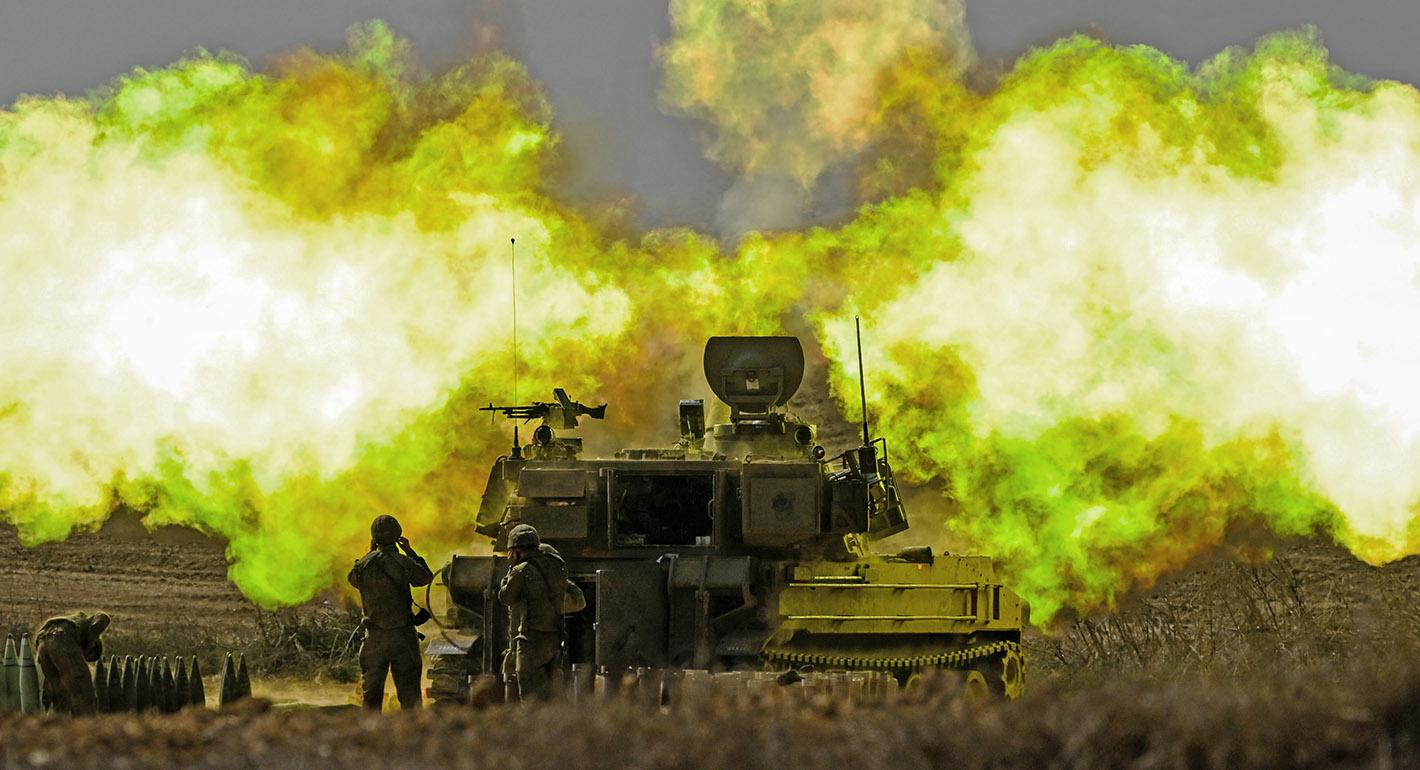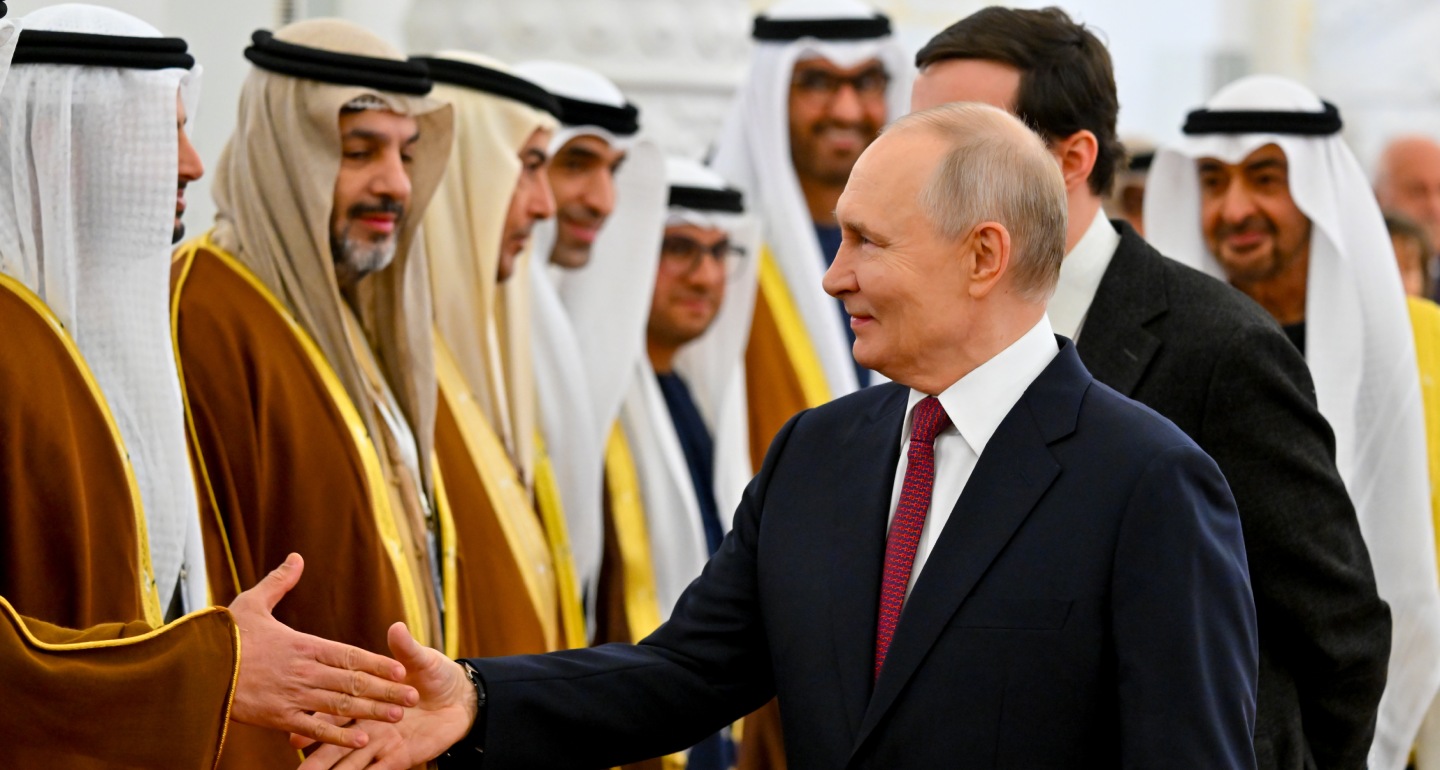Nikita Smagin
{
"authors": [
"Nikita Smagin"
],
"type": "commentary",
"blog": "Carnegie Politika",
"centerAffiliationAll": "dc",
"centers": [
"Carnegie Endowment for International Peace",
"Carnegie Russia Eurasia Center"
],
"collections": [],
"englishNewsletterAll": "",
"nonEnglishNewsletterAll": "",
"primaryCenter": "Carnegie Russia Eurasia Center",
"programAffiliation": "russia",
"programs": [
"Russia and Eurasia"
],
"projects": [],
"regions": [
"Middle East",
"Israel",
"Palestine",
"Russia",
"Caucasus"
],
"topics": [
"Foreign Policy",
"Economy"
]
}
Source: Getty
The Gaza War Has Convinced Russia It Was Right All Along
Events in the Middle East have helped the Kremlin convince itself that Russia’s foreign policy in recent years has been the right one.
The conflict in the Middle East is the perfect crisis for Russia, which is reaping a whole host of political benefits. The confrontation between Israel and Hamas has not only boosted the Kremlin’s hopes of changing the mood around the war in Ukraine, but also strengthened its belief that the Western-centric system of international relations is breaking down.
The full-scale invasion of Ukraine in 2022 put an end to most internal Western disagreements when it came to Russia, uniting countries on both sides of the Atlantic. But the Israel-Hamas war has seen divisions resurface at a state level: while the United States insists Israel has a right to self-defense, there have been bitter disagreements between European countries about what position the European Union should take.
There are also societal divides, with protests by opponents and supporters of Israel taking place regularly from Washington to Stockholm. Even state agencies are not immune to these differing views, with media reports of widespread discontent among U.S. officials with the White House’s pro-Israel stance.
Against this backdrop, the war in Ukraine has slipped down the agenda. The United States has said it will provide help to both Israel and Ukraine. But how long can it really be fully engaged in two major conflicts? Moscow’s hopes that the West will eventually tire of providing open-ended support for Kyiv have never looked so justified.
In addition, Washington’s pro-Israel stance undermines the legitimacy of the West’s broader reasons for supporting Ukraine in the eyes of many in the Global South. The moral argument against Russia’s invasion of Ukraine now looks like empty words, particularly in Middle East nations.
Photos of the ruins in Gaza, reports of thousands of dead children, and the outrage of humanitarian organizations have made a deep impression on people in the developing world. People can argue endlessly about the reasons for the war in Ukraine, or Israel’s operation in Gaza, but for many the conclusion is obvious: the United States was critical of Russia when it killed innocent civilians in Ukraine, and now it is silent when its ally Israel does the same thing in Gaza.
A vision of the world in which morals and ideologies are irrelevant—and the only thing that counts are state interests—has long been the dominant one in the Kremlin. And this logic dictates that there is no better outcome for Moscow than the continuation of the Middle East conflict, which is destroying the West’s strategy toward Russia. Moscow does not even have to lift a finger: Israel’s ground operation in Gaza looks unlikely to end anytime soon. When it does, intractable issues will remain.
True, the escalation in Gaza is not without risks for Russia, and if pro-Iranian forces get sucked in, it could become a major headache for the Kremlin. Moscow’s ties with Iran mean it has been drifting toward a pro-Tehran position in the Middle East for the last couple of years, but that does not mean it is ready to support Iran in a war with Israel. Such a development would oblige Russia to pick a side, and would have consequences for Russia’s intervention in Syria.
For now, however, a broader military conflagration in the Middle East looks unlikely. Iran and its proxies have stayed out of the Gaza conflict so far, which means they are less likely to intervene further down the line.
The Israel-Hamas war also poses some domestic dilemmas for the Kremlin. Judging by statements from officials, October’s anti-Semitic pogrom in Dagestan sent shockwaves through the Russian leadership. Nationalism and Russia’s ethnic republics are issues that previously worried the Kremlin. Now, Middle East policy will need to be made with half an eye on public opinion.
At the same time, minimizing these risks should be straightforward. It would be enough to tone down the anti-Israel rhetoric while maintaining some moderate criticism of the country’s actions. Indeed, the pogrom in Dagestan likely convinced the Kremlin that it’s less dangerous to remain on the sidelines in the Israel-Hamas war than to take an active role.
Finally, events in the Middle East have helped the Kremlin convince itself that Russia’s foreign policy in recent years has been the right one.
A charismatic leader should be able to make those around him believe that he is lucky, and that success comes naturally. Whatever the difficulties, President Vladimir Putin apparently believes that every cloud has a silver lining—and he communicates this confidence to his subordinates. Any successes, particularly if they seem to come from nowhere, strengthen both Putin’s fatalism and belief in Putin’s infallibility. Everything is in God’s hands, and God, of course, is on the side of Russia.
There are also more rational arguments. Moscow’s bet on the disintegration of a Western-oriented international order appears to be paying off. Today it’s Israel and Palestine; tomorrow, it could be Taiwan and China. As such, the Middle East conflict confirms the hypothesis that Russia cannot be isolated. The Global South no longer trusts the West, and that means new opportunities for Moscow.
The conflict also shores up the Kremlin’s hope that the difficulties caused by the war in Ukraine will—with time—dissipate on their own. This approach has been tried and tested by Russia many times. Even if the invasion did not go as planned, the logic runs, everything will resolve itself.
Taken together, all of this means that Russia will remain a passive actor in the Israel-Hamas war. Moscow had no role in triggering the crisis, and couldn’t resolve it even if it wanted to. Russia cannot even play the role of an intermediary, because Israel is nervous of its closeness to Tehran. The only option left is to watch events unfold from a distance and repeat empty phrases about a two-state solution. In the meantime, the benefits the Kremlin is reaping from events in the Middle East only serve to convince the Russian elite that they have chosen the right path.
About the Author

Nikita Smagin
Expert on Iranian foreign and domestic policies, Islamism, and Russia's policy in the Middle East
- How Far Can Russian Arms Help Iran?Commentary
- What Russia Will—and Won’t—Do for Its Embattled Ally IranCommentary
Nikita Smagin
Recent Work
Carnegie does not take institutional positions on public policy issues; the views represented herein are those of the author(s) and do not necessarily reflect the views of Carnegie, its staff, or its trustees.
More Work from Carnegie Politika
- How Far Can Russian Arms Help Iran?Commentary
Arms supplies from Russia to Iran will not only continue, but could grow significantly if Russia gets the opportunity.
Nikita Smagin
- The Kremlin Is Destroying Its Own System of Coerced VotingCommentary
The use of technology to mobilize Russians to vote—a system tied to the relative material well-being of the electorate, its high dependence on the state, and a far-reaching system of digital control—is breaking down.
Andrey Pertsev
- Can the Disparate Threads of Ukraine Peace Talks Be Woven Together?Commentary
Putin is stalling, waiting for a breakthrough on the front lines or a grand bargain in which Trump will give him something more than Ukraine in exchange for concessions on Ukraine. And if that doesn’t happen, the conflict could be expanded beyond Ukraine.
Alexander Baunov
- Once Neutral on the Ukraine War, Arab States Increasingly Favor MoscowCommentary
Disillusioned with the West over Gaza, Arab countries are not only trading more with Russia; they are also more willing to criticize Kyiv.
Ruslan Suleymanov
- How Will the Loss of Starlink and Telegram Impact Russia’s Military?Commentary
With the blocking of Starlink terminals and restriction of access to Telegram, Russian troops in Ukraine have suffered a double technological blow. But neither service is irreplaceable.
Maria Kolomychenko









